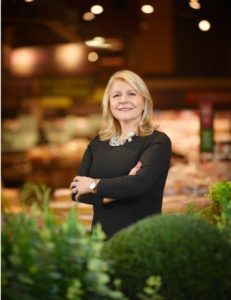
As with most things in a post-COVID-19 world, grocery shopping will never be the same. The simple act of picking up groceries on the way home from work feels like a distant memory, with the experience shifting to a weekly ordeal marked with long lines, sparse shelves and lengthy wait times for online orders as a result of this crisis.
But the fact that consumers are now acutely aware of their supply chain –and the front-line workers who kept it going during this time—is a sign that the grocery retail industry is being recognized for its essential service.
“Grocery shopping, from the consumer side, was viewed as either a task or joy to do,” says Mary Dalimonte (BA ’79), an industry veteran with over 40 years of experience in grocery retail in Canada. “Now, consumers are aware that every aspect of food acquisition is critical to absolutely everybody. From growing and processing to procurement and distribution, to finally ending up in the customer’s home, [this pandemic] has really brought to light for the consumer that it’s not as easy as food showing up on the shelves of a grocery store.”
Dalimonte retired in 2018 as the senior vice president of merchandising and commercial programs at Sobeys Inc., after 11 years with the company. Prior to that, she spent more than 30 years with Loblaw Companies Limited in increasingly senior positions, including vice president of store operations, general manager of retail operations and senior director of multi business unit development. She got her first job as a part-time cashier at a Loblaws in North York, while in high school and continued to work while completing her BA in Sociology at York.
She’s currently president of Mary Dalimonte Inc. Retail and Food Transformations, a retail consultancy, and serves as a board director of Giant Tiger Stores Ltd., and the Italian Chamber of Commerce. Dalimonte remains committed to serving her community as academy mentor at Women in Food Industry Management and mentor leader at the Network of Executive Women organization.
Throughout her career, Dalimonte worked through some of the most challenging times in the industry: the 2003 blackout in Toronto, the ice storm in 2008, as well as store closures due to Hepatitis C infection, to name a few. “This has now amplified the past to extremes the industry has never experienced,” she says about the COVID-19 pandemic. “All the processes they went through, in one way or another, mirror what we’re going through today, only at a much more profound and severe [scale], with many more complex issues to handle at once.”
She credits the industry’s preparedness as well as effective communications from government officials and the stores themselves with dispelling fears of food shortages and avoiding panic-buying among shoppers.
“This has and will continue to change and transform the industry,” she says, from both a supplier/retailer and consumer perspective. Nuanced factors such as millions of Canadians suddenly working from home, the rise in online shopping and changes in merchandising to consider food safety have forced the acceleration of business operations and transformations across all levels.
As for the consumer shopper experience itself, whether that’s online or in brick-and-mortar stores will need to be that much more meaningful and connected to the consumer needs going forward. “It’s going to have to be a highly differentiated experience to gain consumer confidence and loyalty,” she says. “‘Normal’ as we knew it in the past is gone. The ‘new normal’ is forming and changing daily.”
To read the latest information on York’s comprehensive COVID-19 response, visit https://coronavirus.info.yorku.ca/.
